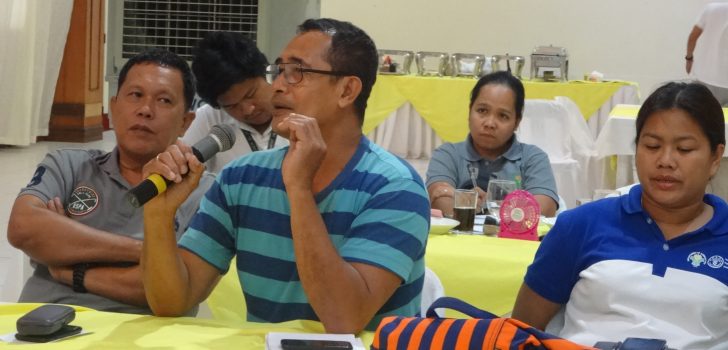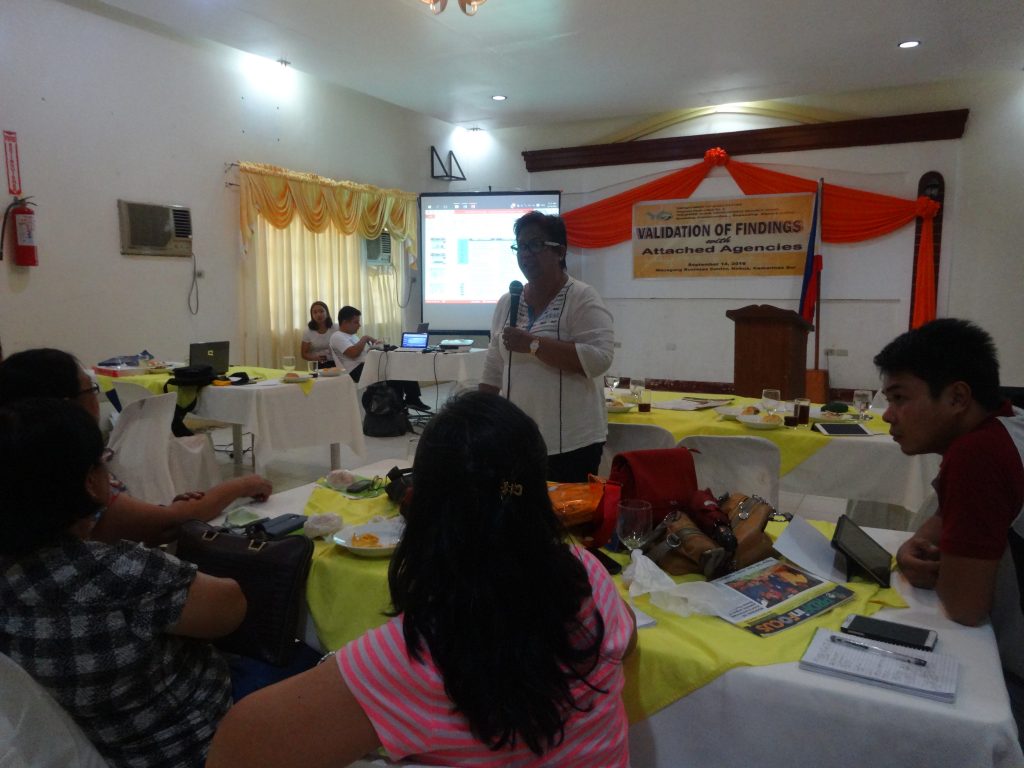 NDA South Luzon Division Project Development Officer IV Salvador Garchitorena shares his insights on dairy cattle production as well as the technical assistance being offered by his agency. (Photo by Annielyn L. Baleza, DA-PRDP RPCO V InfoACE Unit)
NDA South Luzon Division Project Development Officer IV Salvador Garchitorena shares his insights on dairy cattle production as well as the technical assistance being offered by his agency. (Photo by Annielyn L. Baleza, DA-PRDP RPCO V InfoACE Unit) Value chain approach unveils dairy cattle, native chicken, taro leaves’ potential
“Good planning starts with good data.” This was underscored by Aloha Gigi I. Bañaria, local and national level planning (I-PLAN) head of the Philippine Rural Development Project (PRDP) in Bicol. During the validation of findings with attached agencies held on September 14, 2016 in Nabua, Camarines Sur, Bañaria emphasized the significance of value chain analysis in planning and budgeting.
She said, “VCA will surely help planners to consider interventions for farmer clienteles.” The PRDP-Bicol I-PLAN team gathered its provincial project partners, Livestock and High Value Crops Program Coordinators, and representatives from the National Dairy Authority to validate the results and findings of the focus group discussions (FGD) conducted by the research team. The participants provided missing data and additional inputs necessary to finalize the VCA on dairy cattle, native chicken and taro leaves.
On dairy cattle, the participants agreed that trainings must not be limited to management but also to include hands-on actual practice. They also cited the need to strengthen rural-based organizations and identify constraints in both smallholder groups and big organizations. Bañaria said that Bicol’s potential for dairy cattle is supportive to Agriculture Secretary Emmanuel F. Piñol’s 15-point agenda including the expanded nutrition program. She added that the dairy industry can also provide livelihood opportunities for rural women once integrated in the Gender and Development (GAD) program.

PRDP-Bicol I-PLAN Component Head Aloha Gigi I. Bañaria stresses that “Good planning starts with good data” during the Validation of Findings With Attached Agencies held on September 14, 2016 in Nabua, Camarines Sur. (Photo by Annielyn L. Baleza, DA-PRDP RPCO V InfoACE Unit)
Salvador Garchitorena, NDA South Luzon Division Project Development Officer IV, believes that the PRDP will motivate more farmers especially cattle raisers to boost their production. He added that the value chain approach is an effective tool to assess an industry.
“Sa pamamagitan nito, nakita kung ano ang kahinaan at solusyon para maiayos ang industriya (Through this, we have identified weaknesses and formulated solutions to improve an industry),” he said.
Meanwhile, Luz R. Marcelino, Chief of the Department of Agriculture Bicol Research Division, underscores the opportunity for commercializing native chicken. She mentions that purification of the Camarines strain is being conducted at the Central Bicol Experiment Station (CBES). Production of native chicken is also on-going at CBES to improve the breed of native breeds in the region.
Taro leaves’ market potential was also highlighted both as dried and cooked as pinangat, a popular Bicolano dish. It was mentioned that other government agencies like the Department of Trade and Industry and Department of Science and Technology also offer assistance to enhance product quality and boost taro production.
The PRDP-Bicol I-PLAN team initiated series of FGDs with dairy cattle, native chicken and taro leaves stakeholders to get a snapshot of the value chain from input supply, raising, trading, processing to final sale. Key informant interviews (KII) were also conducted with the value chain players in coordination with the provincial project partners and the DA-Bicol’s Agribusiness and Marketing Assistance Division. FGD and KII findings were translated into value chain maps in preparation for the upcoming VCA Training Module 3 scheduled on September 21 to 23, 2016. ### (Annielyn L. Baleza, DA-PRDP RPCO V InfoACE Unit)
